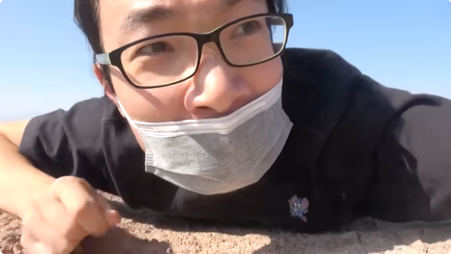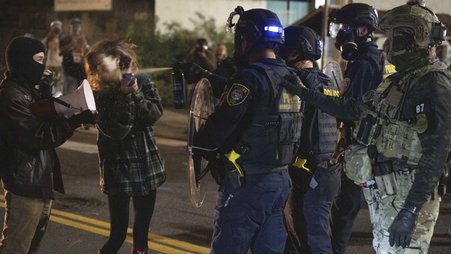Last week, we hosted an X Space forum for independent journalists who reported on protests outside the Democratic National Convention to discuss their experiences dealing with the Chicago police.
To sum things up, the journalists did not give the police positive reviews. That may not be surprising, but the examples they raised show problems exceeding the usual tensions between officers and reporters at protests.
Journalist Ford Fischer kicked off the discussion by noting his alarm at threats from Tom Ahern, deputy director of news affairs and communication for the Chicago Police Department, to take away press passes from journalists who didn’t obey unconstitutional orders to disperse. “In 10 years of doing this kind of work, of covering protests, I don’t think I’ve heard this specific kind of claim,” Fischer said.
I’ve never heard, ever, any police officer anywhere, anywhere, in 20-plus years threaten to revoke press credentials.
Another journalist who encountered Ahern, Tina-Desiree Berg, agreed that Ahern’s antics were unprecedented. “I’ve never heard, ever, any police officer anywhere, anywhere, in 20-plus years threaten to revoke press credentials,” she said. Berg was particularly alarmed by Ahern not only failing to exempt the press from dispersal orders but expressly directing orders at journalists. “He literally said into the bullhorn, ‘Media, you need to disperse. Now, if you don't disperse, we're going to arrest you.’ That to me, was very shocking.”
Videojournalist Sean Beckner-Carmitchel also objected to the threats to seize credentials, noting that they are “not property that belongs to the Chicago Police Department. That would actually, in my opinion, be theft.” He also called out efforts to limit the space from which he could film the protests. “My assignment was to cover the protest, and anything that makes it difficult to do so is not just a violation of First Amendment rights, but also adds to a lack of transparency within the Chicago Police Department,” he said.
Beckner-Carmitchel and others pointed to the Chicago Police Department’s role in issuing press credentials — a procedure that other cities, like New York, have reformed. “The police department is not the arbiter of the media,” he said.
Mel Buer, who reports for The Real News Network, added, “The police presence in the city was meant to overwhelm not just protesters, but also press, and the way that they did this … made it extremely difficult for us to do our jobs and for these protesters to assemble and march.”
Kevin Gosztola of The Dissenter agreed on that point: ”All of these police are there for the purposes of showing off their overwhelming force.” He acknowledged that he opted against covering a protest on the evening of Aug. 20 because he “didn’t trust the CPD not to escalate it into a riot.” Multiple journalists ended up being arrested at that protest.
Buer also called out Ahern, for both his actions and his temperament. “Out of all the people who should be calm, cool, and collected,” it should be him, Buer said. “I don’t think he did his job correctly. … I’m surprised he still has his job.” But Ahern wasn’t the only one. Buer also recalled CPD Superintendent Larry Snelling telling her “I see your press pass, but you’ve got to move,” ignoring the Department of Justice’s instructions not to disperse journalists covering protests.
We agree and have previously said Ahern’s handling of the protests – which included not only threatening journalists but reportedly ripping off at least one journalist’s press badge – should disqualify him from his role with the police department.
Photo and videojournalist Mostafa Bassim, who documented arrests of journalists during the convention, recalled similar experiences, including officers telling him he needed to leave or they’d take his press pass. “Where? There is no place to go,” he recalled responding. “I am press! I am press!”
Independent journalist Talia Jane Ben-Ora pointed to the lack of clarity from police on how journalists could do their jobs while avoiding arrest or dispersal, alleging that police acted “wildly incoherently throughout the whole week.”
I was just at the wrong place at the wrong time, and then, well, nine hours in the slammer
She also noted that, when they weren’t threatening to seize journalists’ press passes, police photographed them, leading journalists to flip their passes over so as not to be visible.
Freelance journalist Olya Fedorova, one of the journalists arrested on Aug. 20, said that having CPD credentials was “making it more difficult” to report because it placed a target on her back.
“When Tom Ahern ordered my arrest, it seemed that he was just personally frustrated by the fact that the press is present,” she said. “I was just at the wrong place at the wrong time, and then, well, nine hours in the slammer,” despite commitments from police to avoid taking journalists off the scene over minor offenses.
The U.S. Press Freedom Tracker’s Stephanie Sugars was not in Chicago for the DNC, but she spent the week monitoring press freedom violations and talking to reporters on the scene for the Tracker, a project of Freedom of the Press Foundation (FPF). She observed that “it should not have come as a surprise that there would be the number of journalists present that there was. That is something that they could have and should have easily accounted for and created a more coherent plan,” she said. She noted numerous accounts of confusing directives from officers.
“You would be directed to get on the sidewalk. Oh, no, you can't be on the sidewalk. Get in the street. Oh, not on this side of the street. Go that direction. Yes, you have to disperse as a member of the media and be outside of this kettle, or we're not going to call it a kettle, because that's illegal. But we're not going to tell you where you can actually exit.”
Some journalists also urged their colleagues to reconsider their approach to dealing with police. Brian Karem noted that having covered every convention since 1984, “I want to tell you, that what we saw was not unusual. … What I always tell journalism groups beforehand is reach out ahead of time and say, ‘Listen, I know you all are going to be worried about us there. We should be involved in that planning.’ Sometimes they'll listen to you. Sometimes they won't.”
if you had seen a cop act that way to anyone else, you would videotape it. You would interview them. You would report it. Don't take yourself out of that mix.
When dealing with police on the scene, he said journalists should “be nice, but be firm,” and must be willing to be arrested. And when police act inappropriately, report it, he said. “If it had happened to anyone else, if you had seen a cop act that way to anyone else, you would videotape it. You would interview them. You would report it. Don't take yourself out of that mix. You're also a human being that deserves to be treated with respect,” Karem said.
“But never get rude or combative with them, because that only plays against you. You've got to maintain that sense of decorum, which is really hard when they're being assholes to you,” he added.
Chicago-based journalist Raven Geary of Jinx Press raised concerns about “parachute journalism” and unnecessary agitation by out-of-town reporters. “You guys get to go home, and we still have to deal with these police,” she said.
“I think as journalists, we have a very big responsibility to the communities we cover not to raise the temperature and not to agitate, because when that police violence comes down, it's going to come down on people who have less resources than us, and are more marginalized than us, and more vulnerable than us, and these police are now amped up after everything that happened,” she said.
You can read and listen to the conversation here, even if you don’t use X. Note that the transcript is AI-generated and imperfect.





